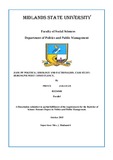Please use this identifier to cite or link to this item:
https://cris.library.msu.ac.zw//handle/11408/2627Full metadata record
| DC Field | Value | Language |
|---|---|---|
| dc.contributor.author | Jakarasi, Prince | - |
| dc.date.accessioned | 2017-07-12T10:36:30Z | - |
| dc.date.available | 2017-07-12T10:36:30Z | - |
| dc.date.issued | 2015 | - |
| dc.identifier.uri | http://hdl.handle.net/11408/2627 | - |
| dc.description.abstract | This research was an analysis of the significance ZANU PF political ideology in the control of intra-party factionalism. A study of the role of the party’s ideology in stages of factionalism was carried out by the researcher and special attention was paid to the activities that unfolded in Hurungwe West from November (2014) to June (2015). Theories were the fortification base of the research. Qualitative research method was used to amass information and secondary and primary sources were used to gather evidence. The researcher made use of interviews, archival sources and both participative and non-participative observations in accumulating data from the selected population sample. The target population comprised of the ZANU PF party and its diverse stakeholders, The Media Houses and The Zimbabwe Republic Police, State agents, former legislator T.Mliswa and the ordinary people in Hurungwe West. About 21 interviews were administered. The researcher was obligatory, he had to utilize the native language thus shone to avail in the interpretation of questions. The data accumulated from the field was presented by the use of theoretical models that explicates the stages of factionalism. The data amassed shows that the party’s ideology played both constructive and destructive role in the ZANU PF fiasco. As a result the researcher had to give recommendations on what has to be done to redress the loopholes in the party’s ideology to avert future political hiccups fuelled by factionalists in the party. An extraction of the role the political ideology in controlling factionalism. Theories were the support base of the hypothesis. Qualitative research method was used to gather information while secondary and primary sources were used to analyse the findings. | en_US |
| dc.language.iso | en | en_US |
| dc.publisher | Midlands State University | en_US |
| dc.subject | Political ideology | en_US |
| dc.subject | Zanu PF | en_US |
| dc.subject | Factionalism | en_US |
| dc.subject | Hurungwe West | en_US |
| dc.title | Zanu PF political ideology and factionalism. Case study: Hurungwe West constituency. | en_US |
| item.fulltext | With Fulltext | - |
| item.grantfulltext | open | - |
| item.languageiso639-1 | en | - |
| Appears in Collections: | Bachelor Of Science In Politics And Public Management Honours Degree | |
Files in This Item:
| File | Description | Size | Format | |
|---|---|---|---|---|
| My final edited dissertation.pdf | Full text | 1.38 MB | Adobe PDF |  View/Open |
Page view(s)
310
checked on Jan 22, 2026
Download(s)
194
checked on Jan 22, 2026
Google ScholarTM
Check
Items in MSUIR are protected by copyright, with all rights reserved, unless otherwise indicated.



